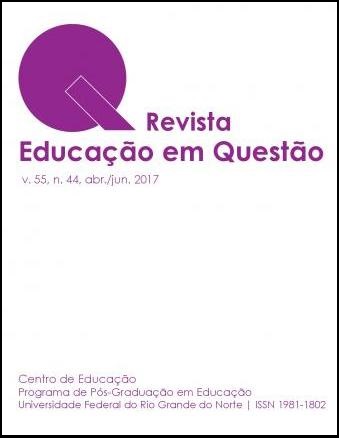A memory pedagogy between war and peace
DOI:
https://doi.org/10.21680/1981-1802.2017v55n44ID12190Keywords:
Citizenship. Historic memory. Memory pedagogy.Abstract
This article takes its foundations from the acknowledgement of the notion and practice of the Memory Pedagogy that has been developed inside the core of the social and education movement of the South in the Post-Dictatorship era, since the last decade of the 20th Century. A formation program for democratic citizenship and human rights assimilates the socalled South Lesson, breaking the tradition of elitism and exclusion provided by the colonial times covered by the civil, urbanist and good manners education program. Moreover, the South Lesson conjugates with the Auschwitz Lesson to confront the dehumanizing project lived in the concentration camps of the World War II. It is with this premises that the article illustrates a possible horizon for victims’ dignity restitution and for the reconstruction of the social fabric, with historic memory researches about the Colombian society, which has suffered a war for more than fifty years.
Downloads
References
Arendt, Hannah.Hombres en tiempos de oscuridad.Barcelona: Gedisa, 2008.
BÁRCENA, Fernando y MÉLICH, Joan Carles. La educación como acontecimiento ético.Natalidad, narración y hospitalidad.Barcelona: Paidós, 2000.
BECK, Ulrich. El individualismo institucionalizado. Barcelona: Paidós, 2003.
CARRETERO, Mario y KRIGER, Miriam. “Enseñanza de la historia e identidad nacional a través de las efemérides escolares”. En: CARRETERO, Mario y CASTORINA, José Antonio. La construcción del conocimiento histórico. Enseñanza, narración e identidades. Buenos Aires: Paidós, 2010. p. 57-80.
CASTRO-GÓMEZ, Santiago;RESTREPO, Eduardo.Las genealogías de la colombianidad.Formaciones discursivas y tecnológicas de gobierno en los siglos XIX y XX. Bogotá: Pontificia Universidad Javeriana, 2008.
DELORY-MOMBERGER, Christine. Biografía y educación.Figuras del individuo-proyecto. Buenos Aires: Facultad de Filosofía y Letras UBA-Clacso, 2009.
DIDI-HUBERMAN, Georges. Ante el tiempo. Buenos Aires: Adriana Hidalgo, 2005.
DUCH, Lluís. La educación y la crisis de la modernidad. Barcelona: Paidós, 1997.
ELIAS, Norbert. Sobre el tiempo. Madrid: FCE, 1989
ESTRIPEAUT-BOURJAC, Marie. “La urgencia del relato hoy en Colombia”. In: FRANCO, Natalia, Nieto, Patricia, RINCÓN, Omar (Editores). Tácticas y estrategias para contar (Historias de la gente sobre conflicto y reconciliación en Colombia). Bogotá: Centro de Competencia en Comunicación para América Latina-Friedrich Ebert Stiftung, 2010.
GRUPO de Memoria Histórica. ¡Basta ya! Colombia: memorias de guerra ydignidad. Bogotá: Imprenta Nacional, 2013
LONDOÑO, Patricia. “Cartillas y manuales de urbanidad y del buen tono: Catecismos cívicos y prácticos para un amable vivir”.Credencial Historia,Bogotá, n. 85. Disponible en www.banrepcultural.or/blaavirtual/revistas/credencial/enero1997/enero2.htm. Acceso en: nov. 2013.
MUÑOZ, Mónica Marcela. “El ciudadano en los manuales de historia, instrucción cívica y urbanidad, 1910-1948”. Historia y Sociedad, Medellín, (Colombia), n. 24, p. 215-240,enero/junio, 2013.
MURILLO, Gabriel Jaime “Cómo los niños y jóvenes de hoy narran y dibujan el pasado y el futuro en la celebración del bicentenario de las independencias americanas”. Uni-pluri/versidad, Medellín, n. 35 n. 2, v. 12, p. 14-21, 2012.
RICOEUR, Paul.La memoria, la historia, el olvido.Buenos Aires: Fondo de Cultura Económica, 2004.
SAÉNZ, Javier.Desconfianza, civilidad y estética:las prácticas formativas estatales por fuera de la escuela en Bogotá, 1994-2003. Bogotá: Instituto para la Investigación Educativa y el Desarrollo Pedagógico –IDEP ?, Universidad Nacional de Colombia –Facultad de Ciencias Humanas, 2007.
SÁNCHEZ, Gonzalo.Guerras, memoria e historia. Medellín: La Carreta Histórica, 2006.
TODOROV, Tzvetan. Memoria del mal y tentación del bien.Indagación sobre el siglo XX. Barcelona: Península, 2002.
VÁSQUEZ, Juan Gabriel.El ruido de las cosas al caer. Barcelona: Anagrama, 2011.
WILLS, María Emma. Aprender a ser humano.Disponible http://uniandes.edu.co/noticias/derecho/aprender-a-ser-humano. Acceso en: 24 feb. 2014.
Downloads
Published
How to Cite
Issue
Section
License
The Journal Education in Question shall retain the copyright in all articles that it publishes.
The authors and co-authors of articles and book reviews, published in the Journal Education in Question, shall wait for at least 1 (one) year before they are allowed to submit new works for publication.






